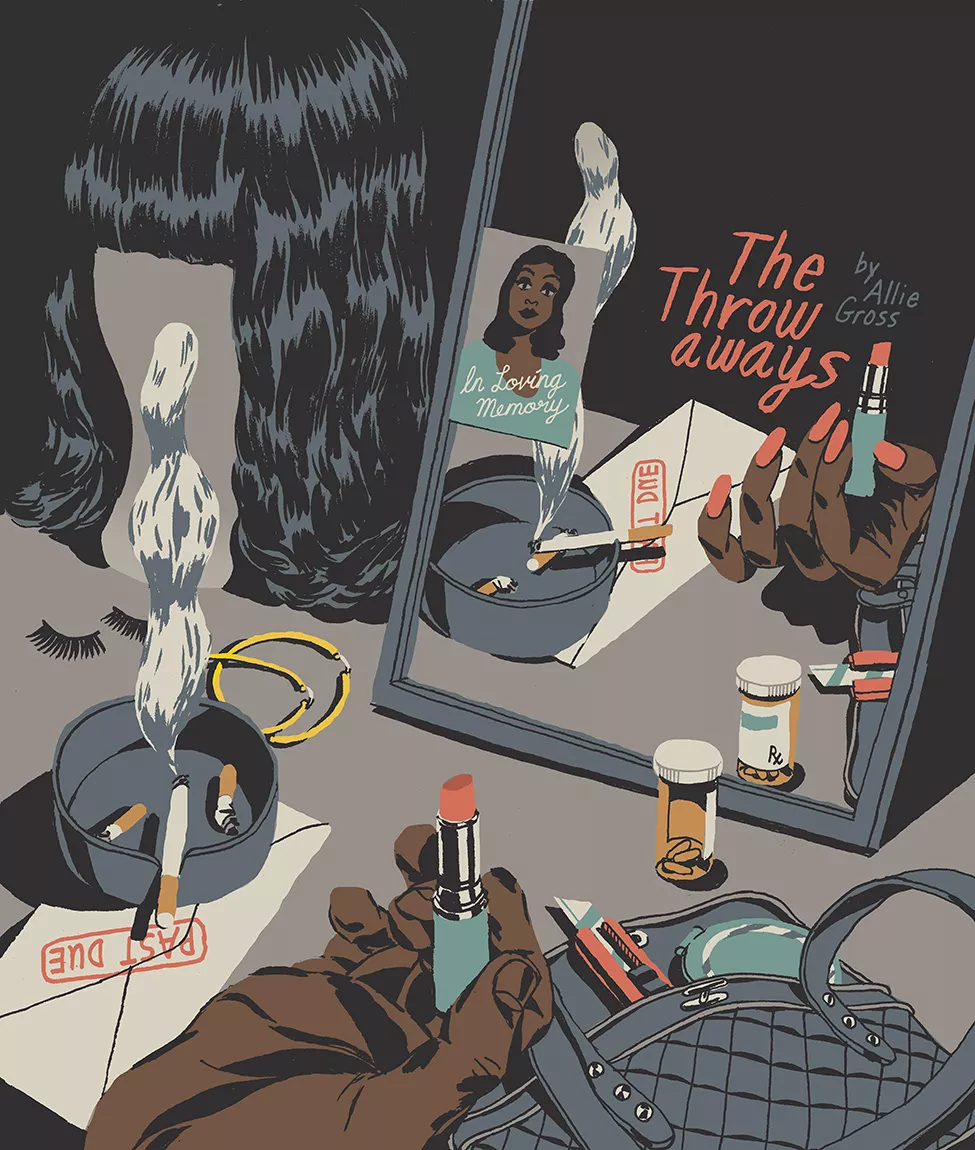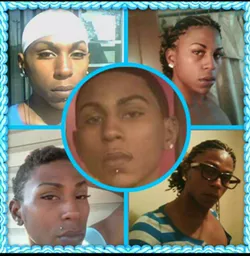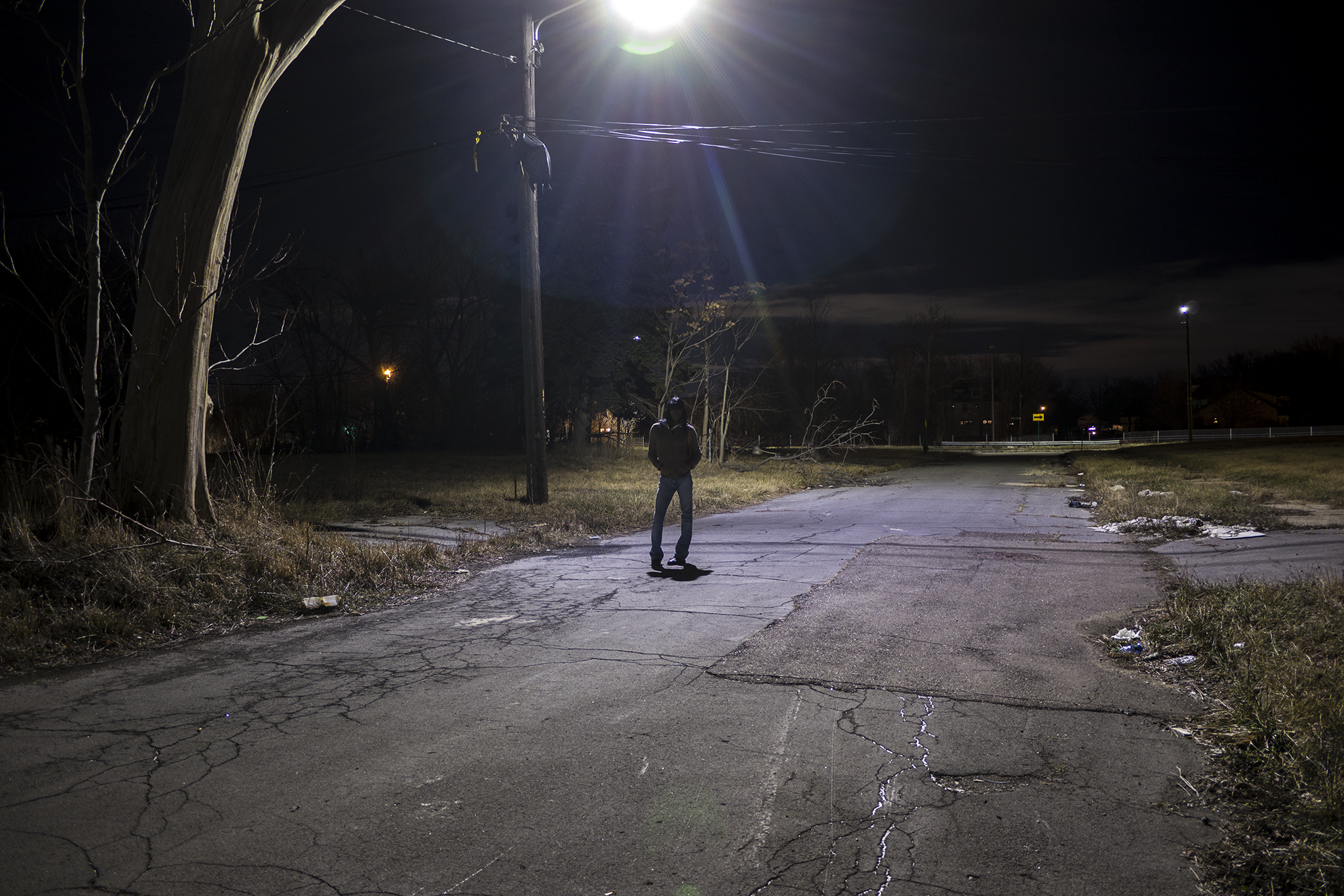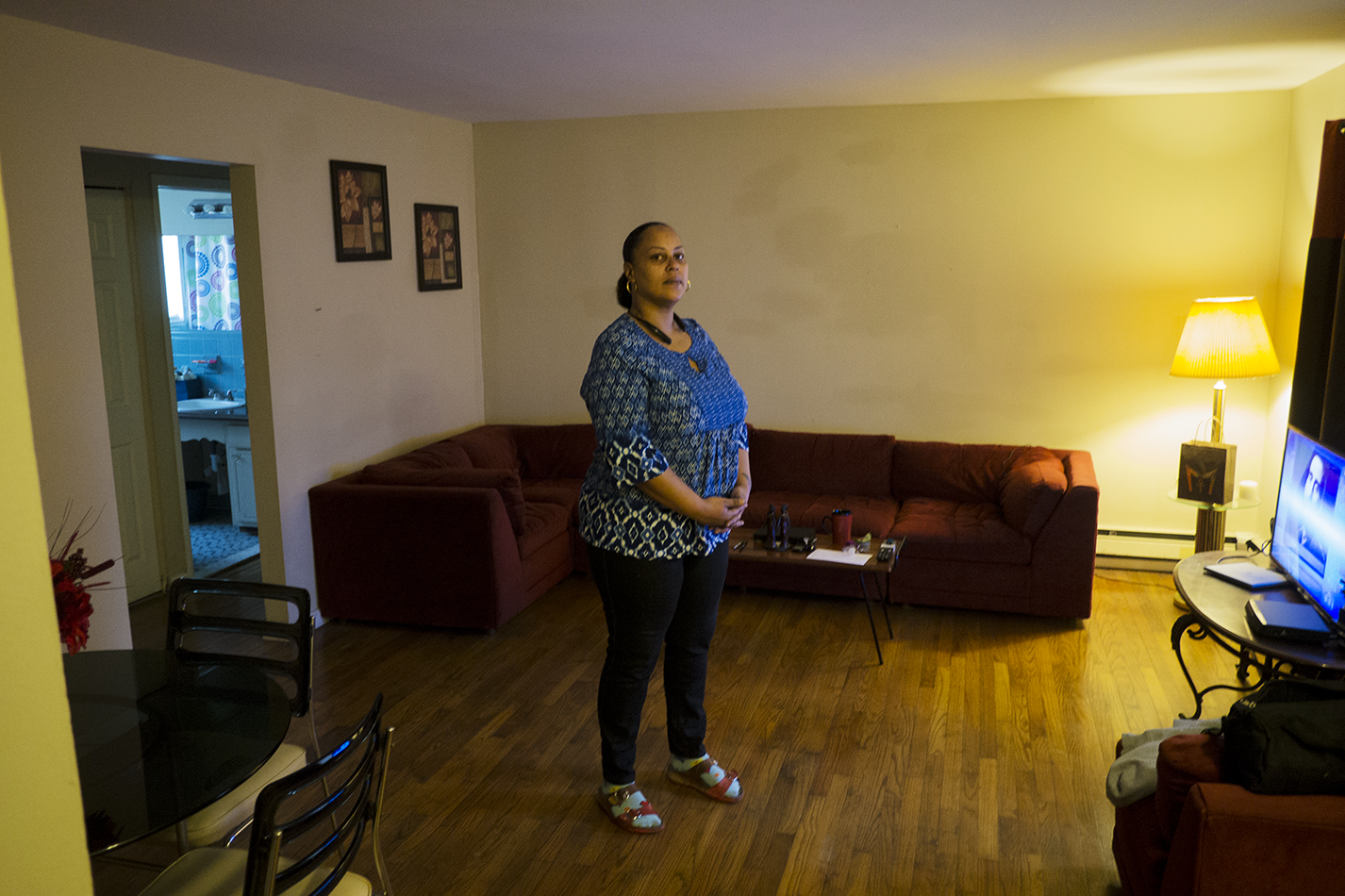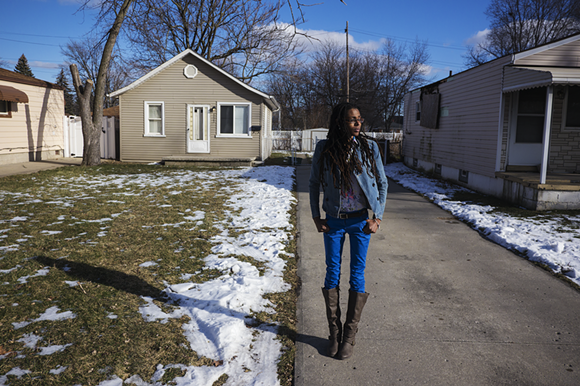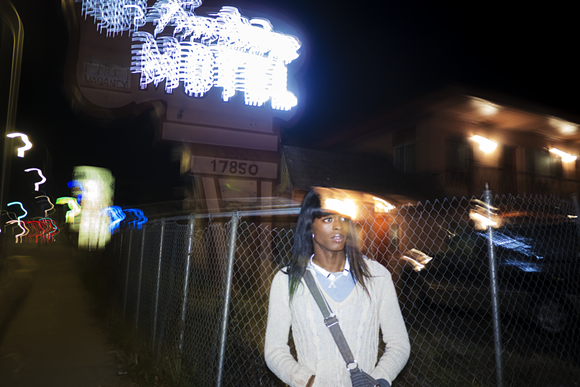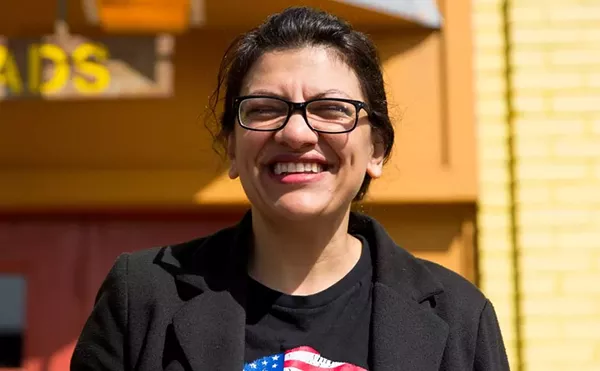AT 10:21 A.M. On a smotheringly humid July morning this past summer, a woman on Detroit's west side dialed 9-1-1.
Six minutes later, a second call came through. The message was more or less the same: A lady, who appeared to be naked, was lying in the intersection of McGraw and 25th Street. She was possibly moving. Maybe hit by a car.
When first responder Officer Michelle Jones arrived at the scene she found a 25-year-old transgender woman, who would later be identified as Ashton O'Hara, lying in a pool of her own blood. Dressed in nothing but a black tank top, red bra, and black footies, Ashton was naked from the waist down. A wig lay 50 feet away from her body. She had been discarded and left behind, like the cracked hubcaps and plastic soda bottles littering the rest of the street.
Shallow breaths puffed Ashton's sternum skyward, an indication to Officer Jones that the victim was still alive. But barely. Ashton had been run over by a car not once but twice and both of her shins were severely fractured, causing tremendous blood loss. The leg injuries were just the beginning. Ashton's body was riddled with stab wounds. Medical examiner Jeffrey Hudson would later testify that many of the cuts were on Ashton's outer wrists. Crossing his arms like a shield and holding them in front of his face, Hudson would explain that the location of the gashes were typically suggestive of self-defense.
At 11:17 a.m., upon arrival at DMC Detroit Receiving Hospital, Ashton was pronounced dead. While she didn't have an ID on her, rumors of the murder skittered across town. Within the hour, Ashton's mom, Rebecca O'Hara, was at the hospital. She identified her child's body and buried Ashton the following Monday.
"It was just overwhelming," O'Hara says now, dabbing away tears as she sits in the Frank Murphy Hall of Justice in downtown Detroit five months after Ashton's death. Waiting for the jury to deliberate in the trial of Larry Gaulding, the man who killed her "Woogie" — a nickname Ashton was given as a toddler because of the way she used to laugh when being tickled — O'Hara is inconsolable.
Since Ashton was a little kid playing with Barbie dolls and testing out different shades of nail polish, O'Hara has wrestled with anxiety about her child's interests and identity. Not because of who Ashton was, but because of what the world was.
The anxiety calcified as Ashton grew into an adult.
While O'Hara was aware of America's seeming progression toward gay rights and equality — as well as the uptick in trans-visibility in mainstream media — she was also clued in to the less appetizing facts.
Facts like: One in four transgender people lives in extreme poverty, with an income of less than $10,000 a year. Nearly 25 percent of trans people in Michigan, who took part in the last comprehensive survey of the population, said they became homeless because of their gender identity and/or expression. Ten percent of trans people drop out of school because of bullying — something Ashton decided to do after the ninth grade.
O'Hara knew these facts and she knew how they translated into real life. She knew that because of job discrimination and a lack of opportunities and education, many trans women, specifically trans women of color like Ashton, turned to survival economies, like sex work, to get by. And she also knew how dangerous this could be, hearing stories of trans women coming up missing, being shot, or found in dumpsters after nights on the "stroll" — a stretch of Woodward between Six Mile and Seven Mile, where Johns look for transgender women for dates.
These were the realities that were on her mind. She feared that the world, despite all its real and apparent headway, wasn't truly ready for biological boys who liked to wear mascara and mini-skirts.
So when the call summoned O'Hara to DMC Detroit Receiving Hospital, when she learned of her child's death and the circumstances behind it, the news was harrowing but also — and her whole body tightens up as she says this — anticipated.
"It was something I was scared of," she says, "for a very long time."
ON JULY 14, 2015 ASHTON O'Hara — who went by the name Jessica Storm among friends — joined a long and haunting list of transgender and gender non-conforming people who have been murdered. While the numbers across the country are staggering — at least 24 transgender individuals were killed in 2015, more than any other recorded year — Detroit, in particular, has become a flashpoint for violence.
Since 2011, seven trans or gender non-conforming individuals have been murdered in the city. Zoom in on 2015 and the gravity of the situation crystallizes. In the three months following Ashton's death, two others — Amber Monroe, a trans woman, and Melvin, a cross-dressing man — were killed. Both murders took place near Palmer Park, a 296-acre green space that runs along Woodward Avenue between Six Mile and Seven Mile. It's where many in the Detroit LGBTQ community congregate. It's also the last place Ashton was seen alive.
This stomach-turning reality is why Julisa Abad, a trans women who moved to Detroit from Tampa, Fla., a little over four years ago, was skeptical when on a balmy August evening — less than a week after Amber was shot and killed — Detroit Police Chief James Craig held an "LGBTQ Community Chat" to "build trust."
"The meeting was long overdue," Julisa says, stressing the word 'long,' as she pushes a curled strand of brown hair behind her bedazzled hoop earrings.
In recent years, Julisa, a plucky 31-year-old with doe like eyes, has stepped into the ill-defined but high-stakes role of local Trans Advocate. The seemingly never-ending stream of violence has kept her busy. "I've seen girls pushed out of cars, shot, walking down Woodward completely naked because they got stripped and robbed in cars," Julisa says. "This has been an ongoing thing."
Julisa is friendly with Officer Danni Woods, the LGBTQ liaison who Chief Craig appointed in 2013. She is also on the LGBTQ Advisory Board that Craig ended up announcing at the August chat in Palmer Park (the board has since met twice). That doesn't mean Julisa's doubts waned.
For Julisa, and the many other trans women Metro Times spoke with, it often feels like police and politicians are more reactive than proactive, swooping in after a murder has taken place, rather than zeroing in on the very real issues that are placing these women in danger to begin with.
Of the seven trans or gender non-conforming people who have been killed in the last four years, all were involved in survival sex work. That fact highlights the dangers of Six Mile and Woodward, as well as the lack of opportunities for so many trans women of color in Detroit.
"There are no opportunities. Nobody is hiring you," Julisa says. "When you look around and everyone in that same area is doing it and there is no hope and nobody has a normal life or a normal job and you know how much you've applied yourself, what more do you have to do? What is left for you to do other than that in order to survive?"
The problem is, as Julisa knows, the very thing so many women are turning to in order to survive may also be bringing them one step closer to death.
JULISA IS CONSIDERED one of the lucky ones. She's had a "real" job since last fall — her first since moving to Detroit.
For $8.50 an hour, Julisa bends and weaves discarded tires, making Motor City-centric macramé plant holders that then get sold for $175 or more in trendy Midtown stores.
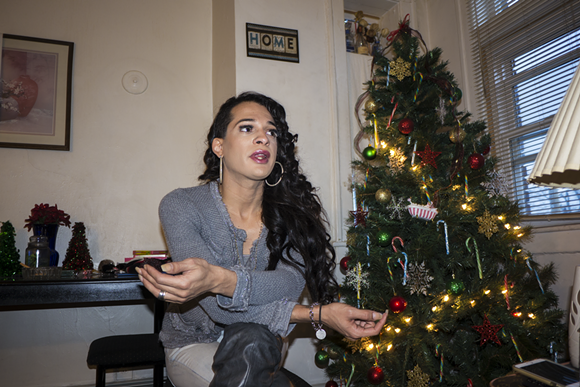
Because her employer Green Industries, an offshoot of Cass Community Social Services, only offers part time work, she is slated for only 21 hours of work a week. In other words, the most she can make in a month — unless production requires more hours — is $714. Of that, 30 percent — based on a sliding scale of how many hours she clocks in — goes toward rent in a 1920s apartment building that is also owned by Cass. Julisa's one-bedroom unit has seen better days. It's spacious but worn, with cracked paint dangling from the kitchen ceiling and a constantly jamming front door. From Julisa's window on the third floor, she can see the M-10 freeway and a succession of burned-out houses.
Still, despite all this, she felt lucky when in October 2014 Cass called to say they had found housing for her; more specifically, they had housing in a mixed apartment with men and women. One pernicious obstacle that trans women face when looking for housing is that shelters typically require them to identify by their birth gender and then try to stick them in all-men dormitories. It's a fact that convinces many to just rough it out on the streets.
Walking through the creaky door the first time, Julisa remembers turning to the Cass administrator showing her around, and asking if they could take a minute to pray. Standing in the middle of the sparsely decorated living room, the two women held hands and closed their eyes, she says. Julisa thanked God for giving her a chance.
"In the beginning I had a lot more hope," she says, alluding to the statistics the Cass apartment helped her defy. A 2011 report from the National LGBTQ Task Force, considered to be the most comprehensive study on trans people to date, found that nearly 25 percent of trans individuals became homeless because of their gender identity and 31 percent reported having to find a temporary place to stay or sleep. On the job front, the numbers are just as startling. In 2011, joblessness among transgender people was at 14 percent — double the national average for joblessness that year — and black transgender respondents experienced even higher rates at 28 percent.
While Julisa is still grateful, her perception of her situation has shifted. When she started at Cass, she viewed the part-time job as a stepping stone.
That's sort of the idea the organization advertises. Providing opportunities to people facing significant barriers — those with HIV and AIDS, individuals suffering from drug addictions, those plagued with chronic homelessness, and single mothers — Cass's mission is rooted in the goal of eventual self-reliance. Once individuals have some stability and get on their feet they will be able to find another job, ideally full time.
Julisa's case, as she's realized in recent months, however, is a bit more complex than most who come through the doors. The very thing holding her back is not something that will change, nor does she want it to: It's her identity.
If people don't want to hire Julisa because of her gender — a painful fact she's come to accept on more than one job interview, where the HR director gave her the rote send-off of, "We'll get back to you," once they realized she was trans — she is stuck in the cycle of poverty. Despite having a job in the formal economy, she is still part of the 25 percent of trans people who make $10,000 or less.
"I never expected when I first started that all this would have happened," Julisa says, musing about her previous life, pre-transition. She had a job working at a Verizon Wireless store in Tampa and had enough money to lease a Dodge Durango and spend $850 a month on rent.
"I've never seen money like that in Detroit," says Julisa, who has completely compartmentalized her two lives. "I've never experienced those things, if that make sense to you. He did and I'm not him. Julisa never got to experience those things. Julisa and he live two very different lives."
LIKE MANY MILLENNIALS, Julisa grew up wanting to be seen. An actor or a news anchor was the original plan. After graduating from Thomas Jefferson High School in 2001 she enrolled in Hillsborough Community College to study mass communications, but dropped out a couple of months later. The traditional school setting didn't resonate; she associated it with her K-12 years and former classmates who made fun of her for wearing rhinestone earrings and painting her nails purple. And so she put her aspirations on hold.
After getting fired from Verizon in 2009, mid-transition, Julisa began rethinking her career path. The LGBT Task Force's 2011 survey found that 50 percent of respondents admitted to being harassed in the workplace and over a quarter said they lost their job because of their gender identity. The suspicion that her request to be called "Julisa" played a role in her dismissal definitely crossed her mind.
And so, post-transition, she revisited her original dreams. While Julisa saw how difficult it was to be taken seriously as a transgender women, she took cues from women like Laverne Cox — the eminent trans actress from Orange is the New Black who got her break on VH1's 2008 I Want to Work for Diddy — and decided to aim for reality TV. It wasn't mainstream acting, but perhaps it could open some doors.
In November 2010, two years after she began taking hormones and living life as her authentic self, Julisa donned a yellow bikini and strappy, studded stilettos and auditioned for The Nak'd Truth, a never-picked-up reality show that asked strangers to work for a month at a nudist resort.
Standing before the show's producers, she knew there were people who would see her as a "freak," who would want to cast her in her birthday suit for the sole purpose of dissecting her body and ridiculing her. She also, however, saw a chance to advance trans issues. Julisa had grown up on a steady diet of unscripted drama and had redolent memories of curling up with her mom, Carmen, as a pre-teen and watching Pedro Zamora, an openly gay 22-year-old, discuss his battle with HIV in season three of The Real World. As Zamora humanized HIV, Julisa says she hoped to bring a face to trans people.
"That was a pivotal day for me because I stood up there and told my truth in front of everybody and was recorded on TV," she says. "It was a big moment for me, even more than the actual show if that makes sense."
She moved to Detroit a year later in November 2011, still holding high hopes for her life as a transgender woman. She arrived in town to film a reality TV show, Motor City Housewives. She changed her Facebook profile's occupation to highlight her new calling ("Head Bitch in Charge" at "Reality TV Star") and created her own hashtag (#TeamAbad). She even added "shian" to her last name (Abadshian) for a period of time to make it sound and look more like Kardashian — the apex of reality TV stardom.
But then, like all fickle industries, the sheen faded. While there had been fun club-night promotional events for Motor City Housewives, the show never got picked up by a network. Without reality TV, which is open to hiring all sorts of people — the more unconventional the better — Julisa was left like many trans women of color: unemployed.
"I thought I was going to continue to model, get a job, like people would know my name. I'd be able to advocate," Julisa says. "I didn't think any of this."
From 2012 to 2014, Julisa did not have a permanent home. Not wanting to sleep on the streets, like some of her trans friends, and not wanting to rough it out in the all-male shelters, Julisa figured out how to game a system stacked against her. During those years she would lease apartments around Palmer Park, knowing that she could go three to five months without paying rent before she was evicted. She never owned furniture. What she did own — piles of clothes and a blow-up mattress — she would keep in boxes. She never unpacked. She knew nothing was permanent.
It is common to hear about "Gay Families" among members of the LGBTQ community. Those with a lot of street knowledge and tips on how to survive may become a "gay mom" or "gay dad" to a newbie who's learning the ropes. Despite Julisa's relative newness to Detroit, she quickly accumulated a number of children — four to be exact. A testament of her resourcefulness.
But sometimes being savvy and knowing where to get a food box, a pair of mittens, or a dental exam isn't enough. On those days, when things got really desperate, Julisa would turn to Six Mile and Woodward.
Metro Times spoke to a number of trans women in two months of reporting who engaged in survival sex work. They all had different reactions toward it. Some felt empowered — it was a way to get their own money. Others enjoy the camaraderie of a shared experience. For some, there was a thrill in the attention, the confirmation that others deemed them attractive. As Ashton O'Hara's mother Rebecca summed it up: "It's kind of like a sisterhood. You know, they get catty, but they stick together. It's something that you can't talk them out of doing. I know that. That's their income. That's their money. That's their conversation amongst each other."
Julisa acknowledges these different views, and understands that speaking out about survival sex work is one way to make it less shameful, less taboo. She knows it's a byproduct of the layers of prejudice and discrimination trans woman face each day. Still, she has a difficult time talking about it.
For Julisa, her discomfort with sex work started before she ever got into her first car and set a price with a stranger. It started the first time someone assumed she was an escort, just because she was trans.
"You're already treated and assumed to be prostitute," Julisa says. "Police will stop you and check for condoms and remind you that you're in an area of prostitution and drugs. You're transgender, so you're a sex worker."
Julisa describes the mental repercussions, what happens when you internalize how the world sees you.
"The police don't even treat us in a humane way. So what's going to make citizens respect us?" Julisa asks. "There are no opportunities. Unless you have a supportive family that understands from the beginning and you're covered with medical insurance, this is it. As a minority and being in poverty, I have not met a trans woman who has been that privileged. It's either do sex work, because we're looked at as sexual objects, be homeless, or be dead."
For some trans women, the reality involves more than one of those options.
AROUND 4:30 A.M. ON July 14, Larry Gaulding, a stout 39-year-old who made his living selling used cars, slowed his white sedan to a crawl as he approached Woodward and Six Mile. He invited a transgender woman named Aisha into his car.
"He was drunk as hell. Really, really wasted, like he couldn't even talk," Aisha, a no-nonsense 27-year-old with a face full of freckles, explains from the comfort of Julisa's dimly lit apartment. The two women have been best friends for years and tell each other everything, but Julisa didn't know until tonight that Aisha had been in Gaulding's car. "We weren't able to decide on a price," Aisha continues. "That's a no-go for me. I don't have time for that."
After dropping off Aisha, Gaulding met up with another escort named Josh Allen. Josh is a gender non-conforming individual who identifies as a man but dresses as a woman, and hits up the stroll at Six Mile and Woodward to make some extra cash from time to time. They too couldn't come to an agreement on prices, so, after exchanging numbers, Josh got out.
Gaulding lingered.
Ashton O'Hara got in Gaulding's car next. They sped away from Six Mile and Woodward. The next time Ashton was seen, she was lying on the hot pavement seven miles away at McGraw and 25th Street. She was dying.
When Detective Johnelle White of the Detroit Police Department's homicide unit was assigned the case, he felt somewhat confident. This was his second transgender case. In 2011 he was the lead detective looking into the murder of Shelly Hilliard, a trans woman who was killed after Madison Heights police allegedly coerced her into snitching on her pot dealer and then disclosed her identity to him (this would become the subject of the documentary Treasure). Detective White felt familiar with the community. As soon as he knew the victim was Ashton, he headed to Six Mile and Woodward. It was there that he was introduced to Josh, who told the detective that Ashton was last seen getting into a white sedan. Even better, as far as tips went, Josh said he had the driver's number from the night before.
While we don't know what happened between Ashton and Gaulding once they drove away from Palmer Park, we do know what Gaulding did after leaving Ashton at McGraw and 25th Street. He drove home — without calling the police — made a sandwich, took a shower and then took a nap.
When Detective Johnell White showed up at Gaulding's house the next day, Gaulding sprinted before Detective White could even say why he was there. Gaulding was discovered hiding in a garage around the block. He was arrested and brought down to the station. It was then that Detective White noticed the blood covering the boxer shorts Gaulding was wearing. A DNA analysis would later link the blood to Ashton. Apparently, after his shower, Gaulding had thrown on the same pair of underwear.
These are details that stuck with Rebecca O'Hara. She brought them up in a public letter that she read to Judge Thomas Cameron during Gaulding's sentencing in January.
"It's sad to think a person, Larry Gaulding, could do this to my child, go home, make a sandwich, take a shower, put on underwear with my son's blood on it, and carry on with his day," read O'Hara, who prefers out of habit to use male pronouns when referring to Ashton even though she acknowledges her child identified outwardly as a woman. "That puzzles me: How could anybody do this and go on with his or her day? What kind of person can do this without a conscious?"
Despite evidence pointing to Gaulding's role in Ashton's death, he pleaded not guilty to charges of pre-meditated second-degree murder.
"Is he trying to hurt us more?" questioned Ashton's grandma Patricia Sanford, the sleeve of her purple T-shirt pushed up enough on her wrist to reveal a tattoo of a lavender butterfly with the name "Ashton" emblazoned below it.
The only logical reasoning Sanford and others in Ashton's family could come up with for why Gaulding pleaded not guilty was that he hoped the jury would view Ashton the way he did — a disposable gay, tranny, prostitute. A throwaway.
JULISA IS BRUSHING her lime green acrylic nails through a row of T-shirts at the Ruth Ellis Center, an LGBTQ center off Woodward, just two miles south of Palmer Park. It's nearly Christmas, which means she's stocking up on gifts.
"Oh!" she exclaims. "This will be so good for Cortez!" She pulls at a plaid button down and stuffs the shirt into a plastic bag for Cortez, her boyfriend of nearly four years. He's unemployed, which means that Julisa, with her $8.50 an hour part-time job, is the breadwinner. It's a fact that wears on her.
"I know when I look back in retrospect that I deserve better and when I think about what I want my children to have..." she says, pausing. "This is horrible but it's my truth: Being transgender, it's so hard to find a man that's even comfortable enough to say, 'This is my bitch,' and walk with you in the street and be affectionate. I put up with so much so that I'm not lonely."
This is an issue she and Aisha discuss often — questioning what they deserve in life, who they deserve in life.
But on this day she's feeling good about Cortez. A few days earlier he bought her a pair of boots, the first gift he's ever given her in the years that they've been together.
Julisa moves along to a pile of fluffy sweaters, settling on a chunky wool cardigan with oversized buttons. She decides it will be perfect for Aisha, who is turning 27 that Sunday. Julisa already has plans to sneak into Aisha's apartment in Palmer Park while she's at church and surprise her with cake, balloons, and now this sweater.
After grabbing a few more things for Cortez and herself — "I don't want to be too greedy," she notes — Julisa breezes into the Ruth Ellis dining room where she says hi to Beyonce, a laid-back 27-year-old who also happens to be one of her gay children, and Savannah, a candid 35-year-old with a commanding presence.
Ruth Ellis provides foster care for youths between the ages of 12 and 17, drop in hours for young people between the ages of 13 and 24, and mental health services for those between the ages of 7 and 30. Julisa, Beyonce, and Savannah are none of those things. Their median age is 31. Ruth Ellis, of course, won't turn anyone away. But the three women are also here because they have nowhere else to go, unless it's Palmer Park, which is where Beyonce will be going soon.
Julisa sifts through the box of food donations while Savannah helps Beyonce get ready for the stroll that night. When her lashes are done, Beyonce unzips her oversized gray jacket and shows off a shimmery tank that she plans to wear out. In plain view across the room sits a row of pictures memorializing some of the trans women who have been murdered over the years, including some on the very same stroll Beyonce will walk later.
Ruth Ellis is closing soon and the women have hulking food boxes to get home. A cab is called; walking would be too far, the bus too dangerous and unreliable.
For Beyonce and Savannah, home is an abandoned two-story clapboard house a few blocks from Palmer Park. For the past four months the two women, their respective boyfriends, and a parade of friends looking for a place to crash have been squatting there.
There is no heat or electricity. To keep warm, the women huddle by the fireplace. When wood is scarce they use something they have tons of instead: bags of donated clothes. A unique scent of sweet onions and burnt hair commingle in the frigid air as burning plastic and cotton crackle under the flames.
"I'm trying to make it ours, but I'm doing it little by little because we don't really have the money like that," Savannah explains as she gives a tour of the house. "We're trying to make something better than nothing."
Downstairs, plastic forks and empty bottles of water litter the floor. The dining room table is stacked high with donated clothes — fuel for the fire.
Upstairs you can see what Savannah is talking about when she says "making it ours." Her room is tidy. Her bed is made. Her bright pink fleece blanket adds a pop of cozy color to the room. There is an effort for normalcy and comfort despite the worst possible circumstances.
"Just because I'm homeless I'm not going to live like I'm homeless," Savannah continues as she drops off the box from Ruth Ellis in the coldest room in the house — their makeshift fridge. "I still try do everything as far as keeping the house together and put a little money into it each chance that I get. So we can live comfortably."
BRE CAMPBELL SPENT a lot of time debating whether she should publicly transition and live each day as the woman she felt inside. The reality of Beyonce and Savannah's living conditions is not remarkable. That is how many trans women survive after being pushed out and derided in the formal economy. Bre knew this and to a certain extent it scared her.
When Bre was 15 she and her family moved to Detroit from North Carolina. She began hanging in queer spaces like the Ruth Ellis Center, which at the time was located in Palmer Park. Around the age of 17, she began seriously considering transitioning, at which point she reached out to an older transgender woman she looked up to for advice.
The woman was really excited, Bre, now 28, recalls. She told Bre that she would dress her up and help her put up an ad. An ad meaning for sex work. When Bre pushed back, the woman countered with a question Bre will never forget.
"How else do you expect to make money?"
It was then that Bre learned one of her first, and hardest, lessons about survival as a transgender woman.
While Bre is not judgmental of those who do sex work — she is well aware of the life circumstances and obstacles her trans friends go through — she didn't like the idea of her gender identity determining her career and life opportunities.
And so, with that in mind, it wasn't until Bre was 24 and had a stable job as an HIV tester and counselor with Wayne State University's Horizons Project that she began transitioning.
Bre's situation is complicated. If Julisa, with her part-time job, is considered one of the lucky ones, Campbell is an outlier far luckier by comparison. The decision to hold off transitioning provided Bre with job security — Wayne State kept her on and in 2015 she accepted a new job as the Transgender Community Specialist at the University of Michigan's Center for Sexuality and Health Disparities — and that comes with its own set of luxuries like a car, health insurance, a stable home in Dearborn Heights. But it also came with a cost. For years prior to her transition, Bre battled depression. She felt trapped in a body that didn't match how she felt on the inside.
"Waiting was more for survival," Bre says. "I was on the verge of suicide and I was trying to figure out how I could live, be myself, and still be able to have access to my family, still be able to have access to employment, still be able to feel safe."
That very real employment hurdle — one that keeps more than a quarter of black trans women unemployed — was highlighted in 2005 when Bre, pre-transition, attended an LGBTQ conference and met some of her heroes in the movement, like revered trans activist Miss Major Gracy-Griffin.
"It was humbling and eye-opening for me because I was under the impression that a lot of the women who we see doing amazing things and running organizations and holding people accountable, I always assumed that they had a little bit — that they were a little bit more financially stable," Bre says.
In reality, many of them were still living in poverty.
The experience stuck with her and in many ways informed her latest endeavor, the Trans Sistas of Color project, which she hopes will not only advocate for the trans community but also employ the trans community — something that is greatly missing from the organizations, social services, and research focusing on trans women.
Housing and jobs are the most important obstacles the trans movement must address, according to Bre. Most funding and researching is centered around HIV/AIDS — trans woman are currently the country's fastest growing population of HIV-positive people. To Bre the focus on risk reduction through condoms and safe sex classes is shortsighted, as many of the systemic issues affecting trans people — violence, HIV/AIDS, homelessness, drug addiction, mental health issues — could be remedied by addressing access to jobs, training, and stable housing.
"If you really wanted to reduce HIV amongst trans women then you would understand this is not just about putting on a condom," Bre says. "I know a lot of trans women who are participating in sex work and they're like, 'Bre, if you know a job let me know, I'm trying to get off these streets.'"
But if no one is hiring, what's a person to do?
IT'S AN ICEBOX cold December evening and Julisa is positively buzzing.
Earlier that afternoon she received an email from the Empowerment Plan, a Detroit nonprofit that hires previously homeless women to make sleeping bag coats for transient people. The floor manager of the organization had reached out to see if Julisa was interested in submitting a resume.
Already she was plotting. The Empowerment Plan would pay a dollar more than Julisa was currently making, and there was room for promotions and growth. What if she could work three days a week at Empowerment Plan, and keep her Cass job, she thought. If she didn't tell Cass, they wouldn't know about the extra income, and her rent wouldn't increase. Perhaps, she would even be able to start saving — something she hadn't been able to do since she lived in Florida.
It was with this excited energy — the hope of something new, something changing — that Julisa greeted her friend Kamal Avery.
"What did you think?" Julisa asks as she lets in a wiry gender non-conforming 20-something decked out in gray and red Nike sneakers, red jeans, and a matching red, gray, and black beanie.
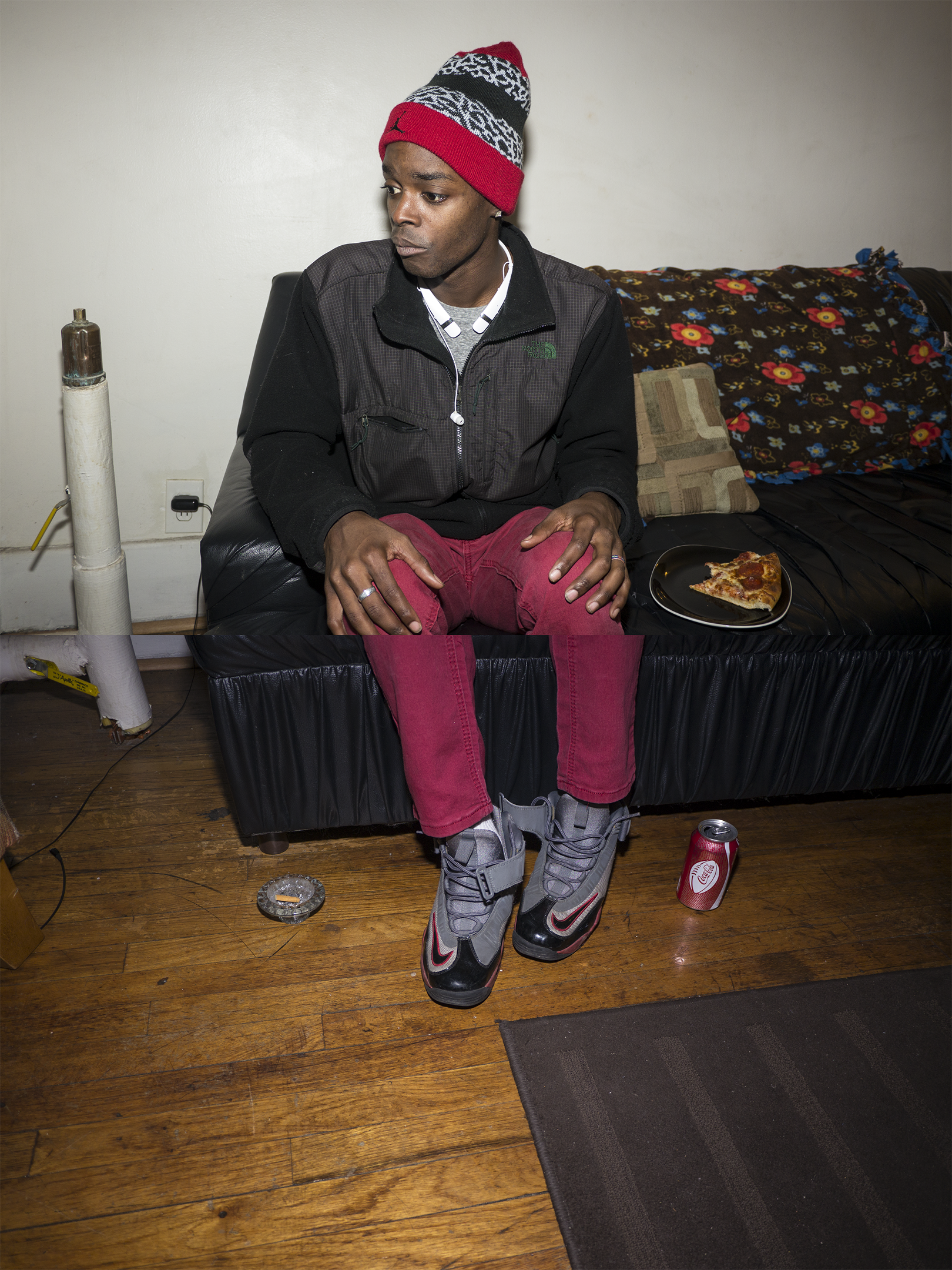
Julisa's friend smiles for a second and then takes a seat. "It almost made me cry," Avery says.
Avery is talking about a Canadian documentary about transgender discrimination that Julisa pulled her into. While Motor City Housewives never got picked up, and Julisa got cut from Bad Girls' Club Season 9 in the final round of auditions, her proximity to media and reality documentation is still present — if not more so than before. In recent months she's spoken to reporters from Vice's Broadly, BuzzFeed, HBO, the Guardian, and Fusion, to name a few. And friends like Avery who turn to Six Mile and Woodward for income are often featured too. Julisa is a connector, and she continues to point any megaphone toward the women she knows so that the world might see how they live.
Julisa presses Avery about how she felt watching herself talk on camera in the video.
"Just the things that I go through to be out there," Avery says. "Being robbed, being homeless out there, going from hotel room to hotel room, or not even the hotel rooms, at the park on park benches. It's really catching me a lot, like this is really life, like I can't go and be a girl like I really want to and get no job."
Avery chooses to dress like a man on a day-to-day basis, simply because she finds it easier. While there's still teasing for being effeminate — she's dealt with that since high school, where she dropped out after the 10th grade — it pales in comparison to the dangers she thinks she would face if she dressed like a woman every day, like she wants to.
That's why when she used to work at Cass Community Social Services with Julisa, she went by the first name of Kamal and dressed as she is on this evening — like a boy. At night, however, when Kamal Avery goes to Six Mile and Woodward, the name changes and so does the wardrobe. Kamal can become Ashley.
The film brings up mixed emotions for the demure and likeable 28-year-old. She is scared to try and get a traditional job living and dressing as Ashley, a woman, which means the only way to make money as Ashley is on the stroll in Palmer Park. Which has its own set of struggles and dangers.
"This is December," Avery says, "standing in the cold on the corner for $20, or $40, or $60, or $100 here and there. I mean it helps. I'm not going to lie, it helps me to eat. It helps me to find out what I am going to do for the next day."
She pauses. "The video was, like, life touching."
There is something unique about Avery being able to see her struggles documented, to see it in the third-person, to get a play-by-play back and see people care. That said, there is the flip side. There is documentation, but things have not changed.
Tonight, she is staying at Julisa's so she doesn't need to go out to make money. But the following night it's back to business as usual. While Julisa's goal is the new job, Avery's goal is $55. That's how much she needs to buy a room for the night at the Motorama Hotel on Woodward and Eight Mile.
Julisa is reading an article about trans news on her phone and interrupts when Avery starts talking about Woodward and Six Mile.
"Aisha got robbed the other night on her birthday," Julisa says. "You need to be careful of a white Cadillac with a busted door."
"DO YOU THINK I should have gone to the trial?" Aisha asks.
Larry Gaulding's trial in the murder of Ashton O'Hara is three days in and Aisha is considering a pang of guilt. She'd assumed, like many, that Gaulding wouldn't be convicted. Facing down the worst possible outcome, it'd been easier in theory to not get involved.
But hearing about Ashton's family attending the trial, Aisha is reconsidering that stance. She'd gotten into the car an hour before Ashton, after all.
"[Ashton] wasn't going to get justice," Aisha says. "I'm just ... I know ... I'm really ... How can I put it? I am vivid with the details and ask a lot of questions. Maybe I could have said something that Josh [Allen] didn't say."
The undercurrent is the expectation that trans women won't get justice. The fear isn't new. It's the next progression when one internalizes society's view that you are disposable. And it's what you question when asking and trusting a jury of your peers — in name only, in a certain sense — to value each life equally.
Detective White, the lead investigator in Ashton's death, expounded on those thoughts.
"Once we get past whether or not the victim did something wrong, now you have the prejudice of their lifestyle," White says. "Absolutely those barriers to justice exist. You just have to hope that someone is educated enough to not let that affect their decision. Because at the end of the day, we're all human and we deserve justice no matter."
The ugly side of that equation unfortunately played out in Ashton's trial, where her line of work and gender identity seemed to be more of a focus than the killing.
"Through this whole court proceeding I felt like my son was the one on trial," Rebecca O'Hara remarked in her open to letter during Gaulding's sentencing.
You wouldn't blame Ashton's mother for feeling that way. The prosecutor merely explained that Ashton was a cross-dressing sex worker. The defense attorneys were even more egregious, referring to Ashton as a "female impersonator" and "dude in drag" on several occasions. Throughout the entire trial, the prosecutor, defense attorney, and the judge all referred to Ashton as a man — something Ashton's mom admits she does, and notices other mothers of trans women do as well. That being said, Rebecca O'Hara doesn't feel comfortable with others doing it. "I think that it's something that's pretty much conditioned in my mind. It's kinda like, it's okay if we [mothers] do it, but it's really not okay if other people and strangers do it."
The sentiment was reiterated by Sanford, Ashton's grandma, who at one point wheeled her walker out of the courtroom, huffing under her breath, "I can't take this. I am so sick of hearing 'Mr. O'Hara.'"
No one heard about the free spirited sensitive woman that Ashton was. Nor did the realities of why Ashton may have turned to sex work ever get brought up. It was simply the cross-dressing sex worker who had done coke and weed.
The language and characterization, unsurprisingly, filtered to the jury. Take, for example, this question from a juror: "Because Ashton had drugs in his system would that mean he would die quicker?"
Gaulding was originally charged with premeditated second-degree murder. The jury ultimately found Gaulding guilty of voluntary manslaughter, a lesser charge that typically carries a sentence of five to 15 years. Judge Thomas Cameron, however, sentenced Gaulding to 30 to 60 years. His decision, while possibly informed by the brutality of Ashton's death, was solidified by Gaulding's rap sheet. Eleven felony charges. Sixty-three misdemeanors. "I have never in my career seen anyone with a record this long," Judge Cameron said.
Despite Caitlyn Jenner, Laverne Cox, Janet Mock, and all the other examples of successful trans women, the world is still behind. And nowhere was this clearer to Rebecca O'Hara than in the courtroom at the murder trial of the man who killed her child. But she already knew, to a certain extent, what was coming.
A few weeks after Ashton's death there was a community meeting in Palmer Park. One older African-American resident stood up and voiced her concern. "I don't want them in my neighborhood," the woman said, referring to the trans women. "They're prostituting by my house."
The woman's comments stuck with Rebecca O'Hara.
"These are people too. They have to eat too. Nobody's really hiring them because they choose to be themselves," O'Hara says. "This is an older black women [who said it]. I'm sure she has come across some barriers to get to where she is, and I look at this as being the same thing. This is a barrier they have to cross until things get better."
JULISA IS IN a tailspin.
After a "really, really, really good" in-person interview, where she was convinced she got the job, the Empowerment Plan got in touch to say they decided to go with someone else. The fact that Julisa wanted to work three days there — in order to keep the Cass job — wouldn't be fair to their other workers, they told her.
While it wasn't her identity that was holding her back, Julisa saw links. She wouldn't have needed to keep both jobs if she wasn't living in poverty — and that fact she could trace to her identity. Julisa was devastated.
Things got worse. Julisa elected to go home a few days — a frustration with a situation where she was starting to feel completely powerless.
When Julisa checked her pay stub earlier today, she was aghast at the number she saw: $89.
Intensifying all of this, she and Cortez broke up. After four years, she called it off in a moment of what seemed like clarity but today feels like insanity. She always knew she was on the cusp of being broke and always felt kind of alone, but now she was really broke, really alone. She already told Aisha, her best friend, about the breakup. "He's gone," Julisa wrote.
Three weeks earlier Julisa had thrown a massive Christmas Eve party for trans women in the city. There was food from Boston Market, music DJed by Cortez and a holiday raffle with gifts Julisa had picked up from CVS: the new perfume gift set from Beyonce (the singer), a pink and white robe and slippers, a toiletry set, and pink headphones. She knew how gloomy the holidays could be for many trans women who didn't necessarily have family to return home to. Julisa's goal was to give the girls something to look forward to. Beyonce, Aisha, Ashley were all there — as was the Detroit Police Department LGBTQ liaison Danni Woods.
Julisa had felt like one of the luckier trans women, someone in a place a privilege, with a job and an apartment, able to collect charity and throw a much-needed party. But tonight she felt completely the opposite — absolutely and utterly hopeless, the one who needed help, an inadequate adult.
"I feel like I am in a prison," she says, before starting to cry as she paces her empty apartment. "I feel like I am in prison because of my identity. I've tried applying for jobs. What else are you supposed to do?"
She had raised over $2,000 on her GoFundMe page to throw events — like the Christmas party — for trans women, and a thought flickered in her head about borrowing some of the money. But Julisa couldn't do it. She wanted to be legit on day, to have a nonprofit, to be the one giving. No she couldn't do that. That money was for the girls who were "worse off."
But what makes someone worse off?
Plopping down on her worn couch, Julisa scrolls through her text messages looking for something she wants to share to make her point.
"Look at this!" she exclaims. "Just look at this."
It's a picture of what someone's arm might look like after a shark attack — a big gaping whole. But that's not what it was.
Over the weekend, Julisa explains, a trans woman who was new to Detroit went to the stroll at Six Mile and Woodward. She had gotten a motel room with a date and things were going fine, until he tried to push things further. She asked for more money and he said he didn't have any. She told him to leave. He left and then knocked a few minutes later, saying he left something. When she opened the door he stabbed her.
It wasn't fatal, so you won't see it in the news. And she didn't report is because prostitution is not only criminalized, but it was probably unclear how the police would react to her if she did call them. Maybe if she had been in Detroit longer she would have known to call Officer Woods. But she was new to town, and she didn't.
With no official record, it won't join the list of devastating statistics about trans violence in Detroit. But it's real: Somewhere in the city, a woman was nursing a shark-bite sized gash on her wrist. The woman's boyfriend had sent the picture of the wound to Julisa. He was hoping she could point them toward a shelter. Even as Julisa felt her life unraveling, there were people worse off who needed her help. Tonight, she could do that.
Julisa closes the picture and switches over to Facebook. Aisha's responded to her message about Cortez.
"Girl, I love you so much," Aisha wrote. "You (we) deserve so much more from life than what's been coming to us. I promise to be your best friend, your sister, your crutch when things get rough. And most of all, I promise to never leave you. With that being said, I love you."
Julisa smiles.
"When I was little... You know how you think about when you're grown..." she says. "I just envisioned 31 to be so different. I'd have a job, a house, a car. So I just keep pushing through hoping one day it will get better. But honestly, some days it just feels like there is no light at the end of the tunnel, and I have to give myself a pat on the back and just remind myself that it will get better."


